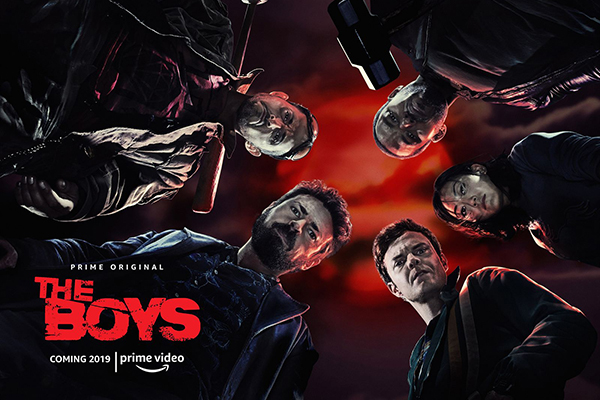The Boys, Season 1
- 30 Aug 2020
- Amazon Prime has their first mainstream hit and it's an edgy adaptation of a comic book in the tradition of Watchmen.

Last weekend, I finally watched The Boys. Coincidentally, it was the same weekend as the DC Fandome event that featured trailers for the latest Wonder Woman and Batman movies. Earlier in the week, trailers for a pair of anticipated video games, starring other well-known DC characters, were unveiled. The coincidence is worth noting because The Boys is partly a satire on the popularity of superheroes and, to a lesser extent, the worship of celebrities.
The show is based on a comic book series of the same name and best described as a contemporary version of Watchmen. Whereas the latter is a deconstruction of the superhero genre set in the Cold War era, the former is a reflection of the superhero genre set in the Social Media era (like today). The superheroes in The Boys are crime-fighters but they are also billion-dollar brands that are carefully handled by a mega-corporation (also like today).
This show portrays superhumans as both super and human. The characters who comprise The Seven, the A-list roster maintained by the Vought corporation, each have super abilities. In the Watchmen universe only Dr Manhattan is superhuman, and even his status as a human is debatable; in The Boys universe, “supes” have super abilities that are apparently present from birth. However, they all have believable insecurities.
The (Anti-)Champions
Even Homelander, the leader of The Seven who is like a terrifying version of Superman, has an Oedipal Complex revolving around Madelyn Stillwell, the Vought executive who serves as their matriarch. The rest of The Seven represent others comic-book archetypes: they are Queen Maeve (Wonder Woman), A-Train (The Flash), The Deep (Aquaman), Translucent (male Invisible Woman), Black Noir (silent ninja), and Starlight (Power Girl).
The Seven fight crime, not as vigilantes, but as municipal contractors who are supported by Vought. Besides being officially sanctioned, The Seven differ from superheroes in other works of fiction because they do harm to innocent people and to each other. Some of this harm is accidental and/or incidental, and even though they’re not truly evil, they’re definitely not totally virtuous either.
The Challengers
For this reason, The Seven have drawn the ire of certain people. The titular group are a motley crew that wages a vendetta against supes. They’re led by Billy Butcher, who has a personal grudge against Homelander. He recruits the hapless Hughie Campbell after Hughie’s girlfriend is accidentally killed by A-Train. Butcher also recruits his former partners Frenchie and Marvin (Mother’s) Milk.
Through Frenchie’s intervention, The Boys bolster their team with The Female, a supe who is like a feral version of Wolverine. Hughie has technical expertise because of his time as an electronics store clerk, and the others have supe-hunting experience because of their time as clandestine government contractors, but The Boys are clearly overmatched. However, they pose enough of a threat to make the show compelling.
My Opinions
It’s interesting that The Boys are, relatively speaking, the good guys. The series could’ve portrayed them as antagonistic foils and been called The Seven instead. Regardless, each side in the conflict is led by a charismatic figure. The main draw of the show, in my view, are the presences of Antony Starr as Homelander and Karl Urban as Butcher. It’s an all-American archetype opposite a Cockney English archetype, portrayed by a pair of Kiwis.
Part of me wishes that The Boys had been a sequel to Watchmen. The Vought corporation of the former could’ve easily been the Veidt corporation of the latter. An aged Adrian Veidt, aka Ozymandias, might well have masterminded some or all of the schemes that are revealed in Season 1. Besides the theme of superheroes not being perfect, the show has the same presentation style as the Watchmen movie in terms of stylized gore and licensed songs.
I appreciate the movie as a condensed version of the landmark book series. I haven’t read The Boys book series, so I can’t comment on the faithfulness of the show. I can comment on my interest in the show, obviously. I was enthralled for the first couple of episodes, but I lost interest a few episodes later. The remaining episodes were a bit more interesting, although I couldn’t be bother to give my full attention to them.
Season 1 has three main revelations that are evenly paced. Without totally revealing them, they involve the origin of supes’ abilities, the prospect of The Seven’s military involvement, and the fate of Butcher’s wife. With the exception of the latter, they’re foreshadowed in a way that’s logical, so they’re not overly shocking. My least enjoyed aspects of the season are Hughie’s repeated deer-in-the-headlights moments and his scenes with Annie / Starlight.
Otherwise, I recommend The Boys to anyone who has at least some interest in the superhero genre. Even though it satirizes the pervasiveness of superheroes in today’s pop culture, the show is still about superheroes. So, I don’t agree with anyone who states that it’s perfect for people who dislike the genre. I think that the entertainment market has been oversaturated with superheroes for the past decade, but I’m going to watch Season 2 anyway.